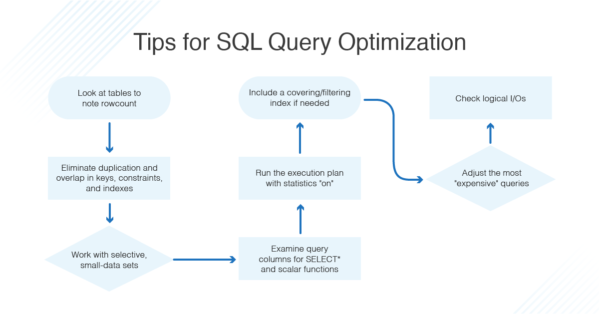Optimizing Database Queries for Improved Performance
Database queries are an essential component of any website or application that relies on data manipulation. However, inefficient queries can drastically slow down your website’s performance. In this article, we will explore some tips and best practices for optimizing database queries to enhance speed and efficiency.
1. Use Indexes
Indexes play a crucial role in optimizing database queries. By creating indexes on the columns frequently used in search conditions or joins, you can significantly reduce the query execution time. Make sure to regularly analyze your database schema and create indexes where necessary to speed up query performance.
2. Avoid Selecting Unnecessary Data
When writing queries, be mindful of the data you are selecting. Avoid using the asterisk (*) operator to fetch all columns from a table if you only need specific data. Select only the columns that are required for your query to minimize the amount of data transferred between the database server and the client.
3. Optimize Joins
Joins are a common operation in database queries, but they can be a performance bottleneck if not optimized correctly. Avoid unnecessary joins and use appropriate join types, such as INNER JOIN, LEFT JOIN, or RIGHT JOIN, based on your querying requirements. Also, ensure that you have proper indexes on the join columns to improve query execution speed.
4. Utilize Query Caching
Query caching can significantly improve the performance of frequently executed queries. By storing the results of a query in memory, you can avoid the overhead of rerunning the same query multiple times. Implement query caching in your database server configuration to speed up query execution and reduce server load.
5. Update Database Statistics Regularly
Database statistics provide valuable information about the distribution of data in tables and indexes, which the query optimizer uses to generate efficient query execution plans. Regularly updating database statistics ensures that the query optimizer has accurate information to make informed decisions and optimize query performance.
6. Monitor Query Performance
Monitoring query performance is essential to identify slow-performing queries and bottlenecks in your database. Use database monitoring tools to track query execution times, identify long-running queries, and optimize them for better performance. By continuously monitoring query performance, you can proactively address performance issues and improve overall database efficiency.
7. Consider Denormalization
Denormalization involves duplicating data in tables to reduce the need for complex joins and improve query performance. While denormalization can increase data redundancy, it can significantly speed up query execution for read-heavy workloads. Evaluate your database schema and consider denormalizing certain tables to optimize query performance in specific use cases.
8. Use Query Optimization Tools
Various query optimization tools are available that can help analyze and optimize your database queries. Tools like EXPLAIN in MySQL or Query Store in SQL Server provide insights into query execution plans, index usage, and performance statistics. Utilize these tools to identify query performance issues and fine-tune your queries for optimal efficiency.
Conclusion
Optimizing database queries is crucial for improving the performance of your website or application. By implementing the tips and best practices mentioned in this article, you can enhance query execution speed, reduce server load, and provide a better user experience. Remember to regularly monitor query performance, update database statistics, and utilize query optimization tools to ensure optimal database efficiency.
